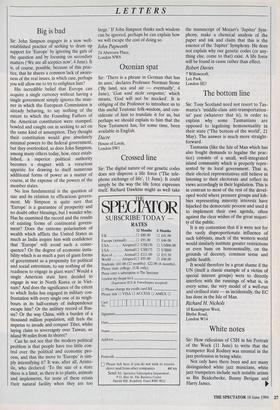The bottom line
Sir: Tony Scotland need not resort to Tas- mania's 'middle-class anti-transportation- ist' past (whatever that is), in order to explain why some Tasmanians are opposed to legalising homosexuality in their state (`The bottom of the world', 21 May). The answer is much more straight- forward.
Tasmania (like the Isle of Man which has also fought demands to legalise the prac- tice) consists of a small, well-integrated island community which is properly repre- sented by its local government. That is, their elected representatives still believe in listening to their electorate and reflect its views accordingly in their legislation. This is in contrast to most of the rest of the devel- oped world where pressure groups and lob- bies representing minority interests have hijacked the democratic process and used it to implement their own agenda, often against the clear wishes of the great majori- ty of the public.
It is my contention that if it were not for the vastly disproportionate influence of such lobbyists, much of the western world would similarly institute greater restrictions or even bans on homosexuality, on the grounds of decency, common sense and public health.
It would therefore be a great shame if the UN (itself a classic example of a victim of special interest groups) were to directly interfere with the runnings of what is, in every sense, the very model of a well-run and civilised state — as incidentally, the EC has done in the Isle of Man.
Richard H. Nichols 10 Kensington West,
Blythe Road, London W14


























































 Previous page
Previous page